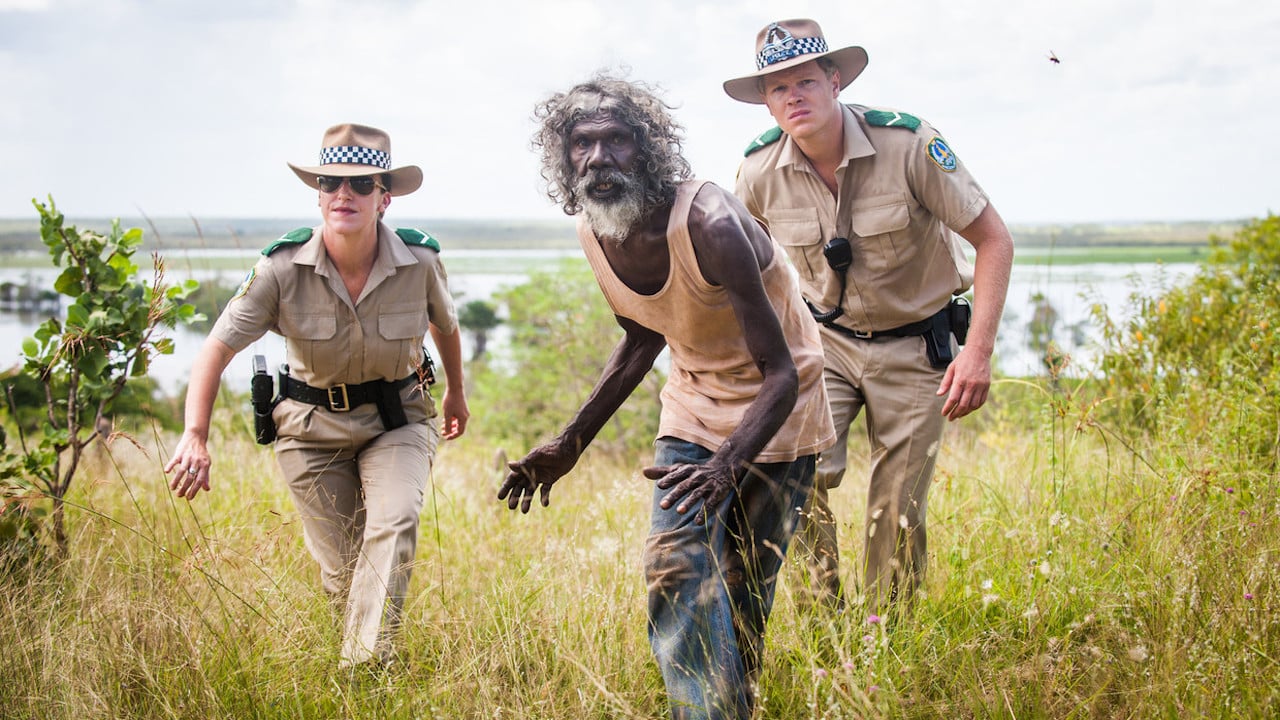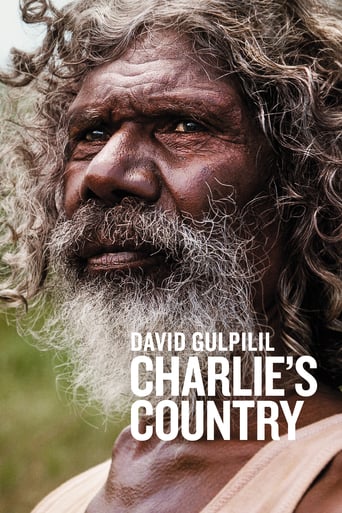

Very very predictable, including the post credit scene !!!
... View MoreOne of the best films i have seen
... View MoreI wanted to but couldn't!
... View MoreGood start, but then it gets ruined
... View MoreCHARLIE'S COUNTRY is a well made piece of social drama from Australia. The concept of the film is to explore race relations between white Australians and the Aborigines, and it's not a very happy story; as expected, racism and the general treatment of Aborigines as second-class citizens has led to poverty and hopelessness on a massive scale. I enjoyed the way that these themes played second fiddle to what is essentially a character-focused drama telling of one old-timer's efforts to get by.I was absolutely delighted when I found out this film's protagonist was played by none other than David Gulpilil, who I've loved ever since I saw his debut feature, WALKABOUT. Gulpilil is typically excellent here, bringing his world-weary character to life with an unheralded realism; he's lived this situation, you can see it in his eyes. CHARLIE'S COUNTRY is a slow film, ponderous in places, but the quality of the direction and the naturalism of the acting is what sees it through.
... View MoreRolf de Heer, director of this film, has a real connection with Australian Aborigines and the really challenging circumstances they find themselves in. David Gulpilil, one of Australia's leading Aboriginal actors, was in the dance troupe that entertained Queen Elizabeth II when she opened the Sydney Opera House in 1973. But now, in this semi-biographical film, back in his country of Arnhem Land in the eastern Northern Territory, he's finding it really hard to fit in. No matter what he does, it isn't right. White man junk food: no good. Going bush to go hunting with a gun: illegal. Make a traditional hunting spear: illegal too – a dangerous weapon. Help the police track criminals: promises go unfulfilled. Doing the best you can for your family: unappreciated, at best. So Charlie heads off and goes bush. And there the challenges continue to pile up. It's an incredibly insightful yet accessible examination of what has proved an insoluble problem for Australia for decades. Pretty much since the British settlers arrived here in the late 18th century and declared that the land was unoccupied (known as Terra Nullius) this situation was set up. Around a third of the film is in native language with subtitles (possibly David's own Yolngu tongue) and this adds to the convincingness of this film. And it has some really funny moments that add to approachability.As a descendant of the British settlers of this country, I have little ideas about what should be done to help the original human inhabitants of our country effectively. What we've been doing isn't working. This film points to the multi-faceted, multi-dimensional problems, but it doesn't find answers either. Maybe there aren't any, except time. Long time - generations. Anthropologists say Australian Aborigines have been here for at least 40,000 years, maybe up to 60,000. Imposing most of western civilisation's development onto an incredibly long lived culture in less than 200 years has obvious challenges. I think this film gives an authentic insight into the issues, and highlights that broadly workable solutions have yet to be found, in a genuinely entertaining way.
... View MoreDutch Australian film director Rolf de Heer take a look of the years running problems of Aboriginal Australians in his last movie Charlie's Country which is shown in many festivals around world. We see the problems caused by two sides from the eyes of an old and stubborn member of Aborigins, Charlie who feels like a outlander on his own lands.Charlie can't accept being assimilated or living like how white Australians impose with the help of his stubborn and shrewd character. With the stunning performance of David Gulpilil Charlie represents all his nation with his riots, outcries, falls and obedience. He makes same mistakes that his nation did but also resists to forget his roots deep in the lands. He is driven away from his village to wild, from there to the big cities and it's crowd and chaos. It takes time for him to accept that this land is same land he loves with every living on it even it has changed.Director's style resembles our Cannes awarded director Nuri Bilge Ceylan with long cuts and silent scenes. Showing same scenes in different spirits and witnessing alteration of Charlie in these scenes can be boring. And yet this style of filming helps a lot to feel the characters and their states better and deeper. Audiences feel all strugglings of all Aborigins from the eyes of Charlie.Fortunately de Heer was in theater for answering questions of us. His care to Aborigins impressed me and hearing all questions about Aborigins proved that he did really good job in his movie with making a difference for Indigenous Australians in the eyes of everyone who watched the movie. That means shooting the target you aimed. I hope it will not take centuries to solve all issues in Australia as he said.
... View MoreCharlie (David Gulpilil), an aging Native Australian living in the Northern Territory, is broke. He does not have a house. He is also hungry and his spirits are low as a result of the erosion of his way of life. Recipient of the award for Best Actor at the 2014 Cannes Film Festival, David Gulpilil is a dominating presence in Rolf de Heer's Charlie's Country, the third film in their collaboration (The Tracker, Ten Canoes). Although much of the film is improvised, Gulpilil co-wrote the script with de Heer while he was serving a prison term. Though the film reflects the actor's personal experience, its theme of the struggle for human dignity in the face of cultural marginalization is universal.Charlie and Officer Luke (Luke Ford) have a good relationship and their banter begins the film. Charlie shouts at Luke, "You white bastards!" to which Luke yells back, "You black bastard!" The fun stops, however, when the police enforce the law preventing Charlie from hunting and fishing. They take his spear because it is considered a dangerous weapon and confiscate his gun because he does not have a weapons license. "I'm gonna shoot it, not drive it!" he tells Luke. While the police are impressed with his tracking ability, Charlie receives no compensation at all for his help in tracking drug dealers.As he sees a member of his community being flown to a hospital far from his land, he makes a decision to return to the bush, to the ways of hunting and food gathering that he knew as a boy. While his body language reflects a new freedom, there is also a deep sadness etched on his face as he realizes he can no longer cope with the physical demands of living in the bush. After a heavy rain, Charlie comes down with pneumonia and has to be airlifted to Royal Darwin Hospital, often a final destination for Aboriginal People. After he leaves the hospital on his own without being released he joins a group of homeless drifters who do nothing but drink and smoke the whole day.After an altercation with the police, Charlie is sent to prison where his hair and face are shaven, looking old beyond his years in the film's saddest moment. All Charlie has left are his memories, especially the one of dancing for the Queen at the opening of the opera house in Sydney. Though there are highs and lows in the film, what is constant is Charlie's sense of identity and his love of his native land and traditions. Though there is a message and the film does make a strong political statement, it is not a one-dimensional screed but a nuanced look at the conditions Native Australians face and their struggle to retain their values in the face of white colonization. Marked by Gulpilil's towering performance, Charlie's Country ultimately teaches us to dance to their rhythm.
... View More